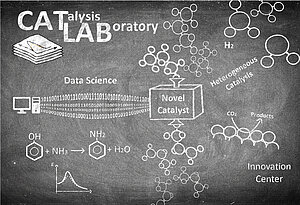The Max Planck Institute for Chemical Energy Conversion together with the Helmholtz-Zentrum and the Fritz-Haber-Institute in Berlin are building a catalysis research platform named CatLab to achieve leaps of innovation in hydrogen research
Hydrogen as a sustainable fuel source will play a key role in our energy system for the future. Hydrogen-based chemical energy media are needed as long-term storage repositories in the energy system and are crucial for climate-neutral design of industrial processes. The German federal government's National Hydrogen Strategy clearly identifies the great need for research in this area, which will be the foundation for breakthroughs and leaps in innovation. The Max Planck Institute for Chemical Energy Conversion, the Helmholtz-Zentrum Berlin, and the Fritz Haber Institute are pooling their expertise for this purpose and are jointly establishing the CatLab research platform in Berlin. CatLab is intended as a bridge between pure research and industry, and is being funded by the German Federal Ministry of Education and Research (BMBF) with more than 50 million euros. In total, the five-year development project will cost about 100 million euros.
Please find further information in our press release.

